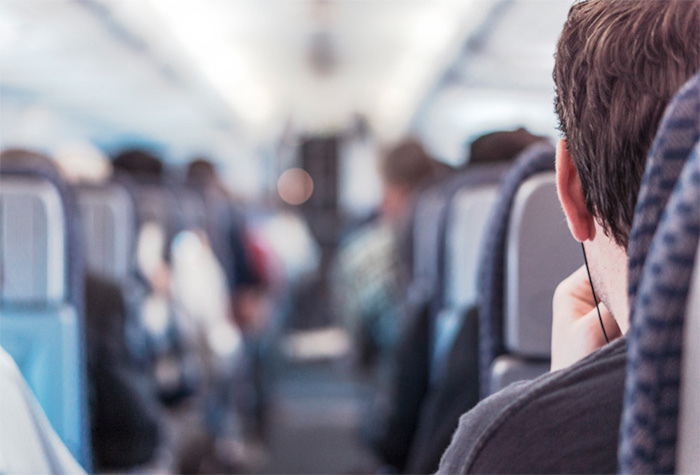Doctors know this condition as “desynchronosis.” Just like the name implies, it happens because your body clock becomes out of sync with the time zone you traveled to. Travel fatigue is actually one of the most common sleep-related condition.
Travel fatigue isn’t only related to the length of your flight. It’s related to how many time zones you cross, particularly when traveling east. It takes roughly a day per time zone to readjust and increase energy levels while traveling. That’s a lot of time in recovery depending on where you’re traveling. Not to mention that it takes longer to recover as you age. Don’t let sleep deprivation and fatigue get you down while traveling! Use these tricks to make the best out of your trip.

“Cues such as light exposure, mealtimes, social engagement, and activities regulate our circadian rhythm. When you cross time zones, it disrupts those, and your internal clock and the external time are out of sync. Your body needs to get on the rhythm of the new time zone.”
—Allison T. Siebern, PhD. on WebMD
Why Let Jet Lag Take Over Your Travel Plans?
Don't succumb to sleep deprivation. You may think you can handle travel-related fatigue, but why suffer through the side effects ? Why wouldn’t you want to be alert and attentive, especially if you’re traveling for business? In case you’re new to traveling, some symptoms of jet lag may include:
Sleep disturbances
- Inability to sleep
- Waking up too early
- Interrupted sleep
Cognitive effects
- Anxiousness
- Headache/Dizziness
- Mental Fog
- Confusion
- Trouble with memory, concentration
- Moodiness, irritability
- Fatigue, disorientation
Gastrointestinal Problems
- Nausea/vomiting
- Constipation
- Diarrhea
Beat Jet Lag and Boost Energy With These Travel Hacks

1. Change Your Bedtime
A few days before your next flight, adjust your bedtime. Go to bed earlier or later, depending on your destination. Try offsetting your sleep by an hour each night until you’re sleeping on the new schedule. Even a slight change to the time of your destination is going to help your body adapt to the time zone your final destination is in.
Don’t have time to figure that out? No sweat, Jet Lag Rooster has you covered with a highly adaptable, calculated plan to prevent jet lag. If Jet Lag Rooster’s calculator is too detailed, try the app from British Airways. Be sure to avoid alcohol and caffeine leading up to your flight though.These substances influence your circadian rhythm, which will void your bedtime changes.

2. Schedule Your Flight Strategically
Plan your flight so that you arrive in your destination at the best possible time to adjust. If the flight is not that long, don’t sleep on it. Instead, get on a flight where you arrive in the evening and go to sleep around 10 p.m. If it’s an overnight flight, get some sleep and plan to arrive early morning. Be ready to start the day after landing.

3. Beat Jet Lag w/ OptiMind
OptiMind is full of vitamins for optimal cognitive function. These vitamins help relieve brain fog and increases energy without the after effects of other stimulants, like coffee. They may also combat the symptoms of jet lag, like difficulty concentrating or fatigue. If you had an overnight flight, take some OptiMind when you land in the morning. If you arrived at your destination during evening hours, take RestUp before going to sleep. Follow up with OptiMind in the following morning to help feel recharged. Combining the ingredients in OptiMind and RestUp will help you adjust your sleep habits according to the new time zone you are in.

4. Adjust Time
Before you get on the plane, change your watch and the time zone on your phone. Get your brain to start planning according to the time it is in your destination. Think about your activities based on that time. For example, if it’s dinnertime at your destination, get an in-flight meal or snack. If it’s 2 a.m., go to sleep.

5. Sleep Well
If you’re going to sleep on your flight, then make sure that sleep counts. Remove distractions by bringing earplugs, blindfolds, and a pillow to prevent travel-related fatigue. Sleeping on a plane isn’t easy, but canceling out noise and light will improve your sleep quality by far. That means you feel rested when you wake up and not so drowsy.

6. Stay Hydrated
Airplane air is stale. More than that, it’s downright dry. Don’t let yourself become dehydrated. Continue drinking water. If it is daytime at your final destination, get up out of your seat often and stretch. Take bathroom breaks.
Re-hydration is key for feeling energized and alert. Drink as much water as your body needs. Avoid alcohol and caffeine leading up to and during your flight. Avoid alcohol and/or caffeine a couple of days before your flight. They can disrupt the new sleep cycle you’re trying to establish.

7. Mellow Melatonin
In 2002, researchers studied the effects of synthetic melatonin tablets on travelers. They found that melatonin significantly prevented or reduced fatigue for travelers by supporting normal sleep patterns. If you take melatonin, use precaution. Melatonin is a hormone for sleep regulation. Too much supplementation to reduce your body’s natural production.
“Recommended for adult travellers flying across 5+ time zones, particularly traveling east, and especially if experienced jet-lag on previous journeys. Travellers crossing 2-4 time zones can also use it if need be.”

8. Harness the Power of the Sun
Have you ever noticed that traveler's fatigue doesn’t seem so bad when traveling to sunny, tropical areas? That’s because sunlight is super energizing. Similar to melatonin, sunlight alters your circadian rhythm. It is another great solution for adjusting to a new time zone. But, depending on where you’re traveling to and from, you may want to avoid it.
Try a combination of these tips in order to prevent experiencing symptoms of jet lag while traveling. You may also try all of them! Happy travels.

